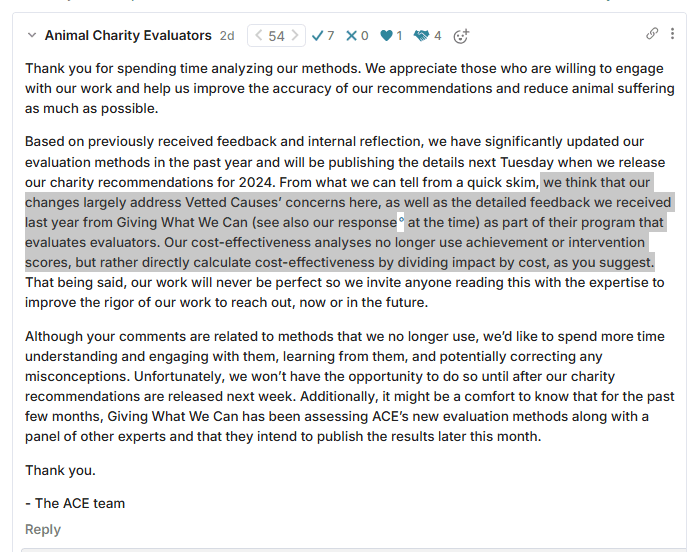Hi everyone,
Recently, I decided to read one of ACE’s charity evaluations in detail, and I was extremely disappointed with what I read. I felt that ACE's charity evaluation was long and wordy, but said very little.
Upon further investigation, I realized that ACE’s methodology for evaluating charities often rates charities more cost-effective for spending more money to achieve the exact same results. This rewards charities for being inefficient, and punishes them for being efficient.
ACE’s poor evaluation process leads to ineffective charities receiving recommendations, and many animals are suffering as a result. After realizing this, I decided to start a new charity evaluator for animal charities called Vetted Causes. We wrote our first charity evaluation assessing ACE, and you can read it by clicking the attached link.
Best,
Isaac




Note: this reply addresses everything Abraham claims we did not provide evidence for.
“ACE's poor evaluation process leads to ineffective charities receiving recommendations”
Our review covered how under ACE’s evaluation process:
This is clear evidence that ACE uses a poor evaluation process. Is the fact that ACE’s evaluation process rewards inefficiency, and punishes efficiency, “no evidence” for ACE recommending ineffective charities?
If you’d like me to get even more specific, let’s look at Problem 1 of our review:
We go on to detail how if LIC had spent less than $2,000 on the lawsuit (saving over $200,000) and achieved the exact same outcome, ACE would have assigned LIC a Cost-Effectiveness Score of 1.8. The lowest Cost-Effectiveness Score ACE assigned to any charity in 2023 was 3.3. This means if LIC had spent less than $2,000 on the lawsuit, LIC's Cost-Effectiveness Score would have been significantly worse than any charity ACE evaluated in 2023.
Instead, LIC spent over $200,000 on the lawsuit, and LIC rewarded them for this inefficiency by giving them a Cost-Effectiveness Score of 3.7, and deeming LIC a top 11 animal charity.
As we noted in our review, these Cost-Effectiveness Scores are defined by ACE as “how cost effective we think the charity has been”. LIC achieved no favorable legal outcomes despite receiving over a million dollars in funding. As we also noted in our review, every lawsuit LIC filed was dismissed for failing to state a valid legal claim.
If I provided evidence that a Law Firm Rating Organization rewards law firms for losing lawsuits and wasting money, and punishes law firms for winning lawsuits and saving money, would this be no evidence that the Law Firm Rating Organization is recommending ineffective law firms?
Our review details how ACE’s recommendations direct the flow of millions of dollars. Are you asking for evidence that directing millions of dollars toward ineffective animal charities, rather than effective ones, leads to animal suffering?
Imagine a film critic watches 5 of the 11 films that received a 'Best Films' award and writes, “Of the five films I’ve seen, only one appears to deserve the award. I plan to release my reviews of the films shortly.” Does this statement by the film critic require evidence?